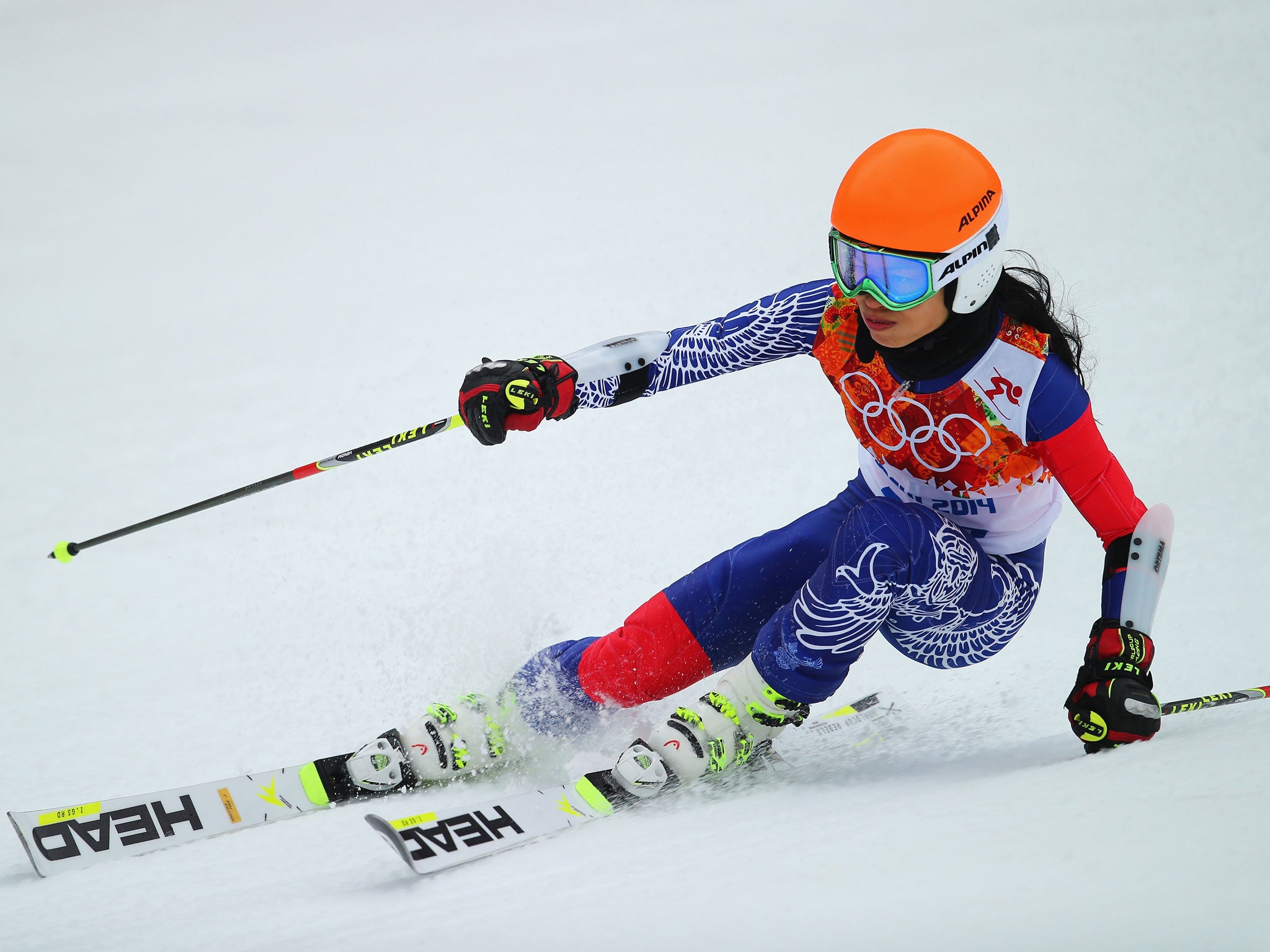Winter Olympics 2014: A giant leap for Vanessa-Mae, but a small step back for the cause of women's sport
Mae was the last of the 67 finishers but was happy with completing the course as a whole host of competitors failed to finish the two giant slalom runs

Your support helps us to tell the story
From reproductive rights to climate change to Big Tech, The Independent is on the ground when the story is developing. Whether it's investigating the financials of Elon Musk's pro-Trump PAC or producing our latest documentary, 'The A Word', which shines a light on the American women fighting for reproductive rights, we know how important it is to parse out the facts from the messaging.
At such a critical moment in US history, we need reporters on the ground. Your donation allows us to keep sending journalists to speak to both sides of the story.
The Independent is trusted by Americans across the entire political spectrum. And unlike many other quality news outlets, we choose not to lock Americans out of our reporting and analysis with paywalls. We believe quality journalism should be available to everyone, paid for by those who can afford it.
Your support makes all the difference.When the Olympic circus packs up and leaves town, the plan is to open the slopes of Rosa Khutor for tourists to follow in the ski tracks of the Alpine greats. Today, as the first snow of the Games fell on the mountains, the first Olympic sightseer was given an early go. This was a giant leap for Vanessa-Mae and a small step back for the cause of women’s sport.
Racing as Vanessa Vanakorn, her father’s name, and for his country Thailand, Vanessa-Mae came 67th and last in the women’s giant slalom. When the times for her two runs were added up she was more than 50 seconds slower than the winner, Tina Maze of Slovenia, and a dozen slower than the woman who finished in 66th place.
“It’s so cool,” said Vanessa-Mae of achieving her dream to be an Olympian before she returns to the day job as a hugely successful classical musician. At 35 she was the oldest woman in the field. “You’ve got the elite skiers of the world and then you’ve got some mad old woman like me trying to make it down. I think it’s great the Olympics is here, it gives you the chance to try something new later in life.”
At a time when campaigners are pushing vigorously for long overdue better – and more respectful – coverage of women’s sport, the sight of Vanessa-Mae, in a bright orange helmet, carefully negotiating her way down the slope was not designed to push the cause. At least she made it through both her runs. Twenty two did not, including Julia Mancuso, an American who had her sights on a medal.
Read more:
“I was just happy I didn't get lost, because this was my first two-gates [there are red and blue gates on the course] and I thought I was going to go the wrong side, but I made it down,” said Vanessa-Mae.
Under the rules of the FIS, skiing’s governing body, each non-Alpine nation is allowed to enter a solitary skier in the Games. The giant slalom is the most straightforward event, without the speed of the downhill and without the need for the technical skill required for the tighter gates of the slalom. It makes this race one for a minnows outing. There were 48 different nations taking part, including Malta, Portugal, Morocco, the US Virgin Islands and Togo – represented by an Italian who has also skied for India.
In the likes of Eddie the Eagle and the Jamaican bobsleighers, the Winter Olympics has had plenty of enthusiastic amateurs. The difference with Vanessa-Mae is that they were at least committed to their sports and trained long and hard to get there.
Vanessa-Mae trained for six months, describing her decision to try for the Olympics as a “last-minute kind of thing.” She has been skiing since the age of four, having learnt during family holidays in Val d’Isere and St Moritz. She always wanted, she says, to be a ski bum. Instead she became an Olympian.
To qualify athletes have to compete in a certain number of FIS recognised races to gain a world ranking. Vanessa-Mae persuaded the Thai Olympic association to accept her – she is British but since Eddie the Eagle the British Olympic Association has imposed more stringent qualifying standards. She just made the Games, competing in two low-key races over one weekend in Slovenia last month to earn a world ranking of 2,253. There were mutterings on the slopes that the FIS have been overly accommodating to her bid to make it here
“My main focus was to really have a good time, to improve my speed in a very, very short amount of time and to help some animals out here [she promised a donation to animal charities if she made it to the Games],” she said.
She did improve her time, reaching the bottom two seconds faster in her second run. Meanwhile Maze had long since completed a rare sporting double, adding slalom gold to her downhill one. It had not been done for 40 years. That is a sporting achievement worth celebrating.
Join our commenting forum
Join thought-provoking conversations, follow other Independent readers and see their replies
Comments